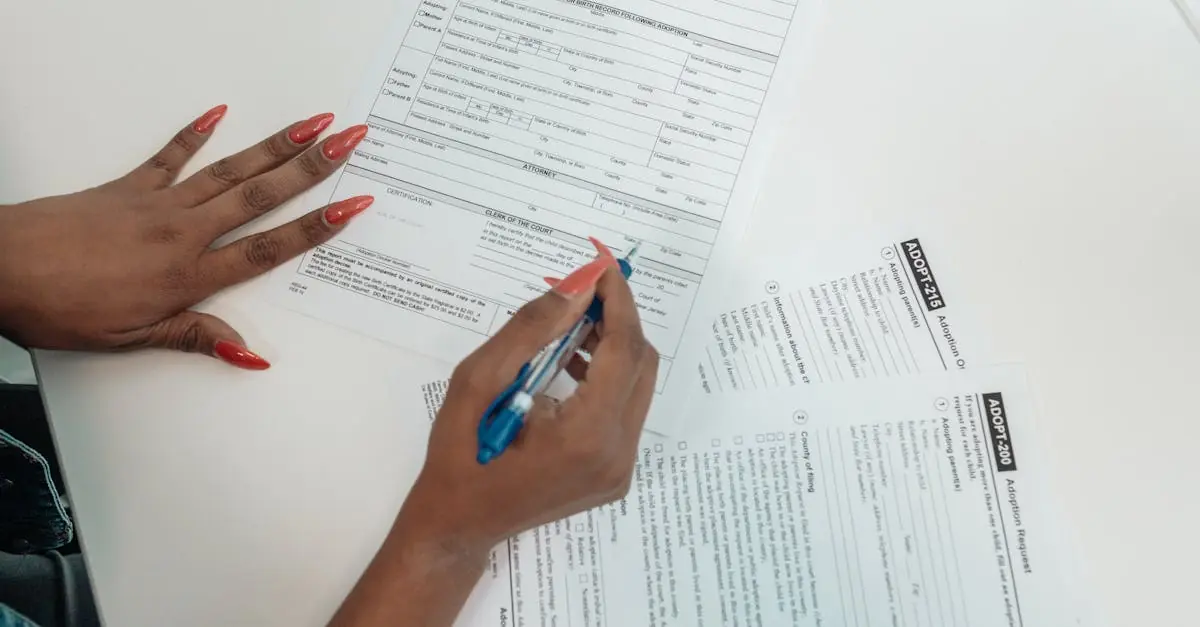Navigating the promotion application process can feel like trying to find a unicorn in a haystack. It’s a wild ride filled with excitement, anticipation, and maybe a few moments of sheer panic. But don’t worry—getting that coveted promotion is more achievable than you might think. With the right strategy, you can turn your application from “meh” to “wow!”
Table of Contents
ToggleOverview of Promotion Application Process
The promotion application process entails several steps that require careful attention. Before submitting any application, candidates must understand the criteria outlined by their organization. Meeting these criteria proves essential for advancing to the next level.
Strong self-assessment plays a critical role in the process. Identifying personal strengths and areas for improvement allows candidates to tailor their applications effectively. Collecting relevant accomplishments also boosts the application. This includes quantifiable achievements and specific examples of past contributions to the organization.
Researching organizational needs remains vital. Understanding the goals of the department or company can guide applicants in aligning their experiences with those expectations. Networking with mentors or peers can provide insights that enhance the application further.
Preparing application materials requires diligence. Crafting a compelling resume or CV showcases qualifications and experiences. Clear and concise language is crucial; applicants should strive to articulate their successes effectively.
During the interview phase, candidates must present themselves confidently. Practicing common interview questions promotes readiness. Providing detailed responses that connect past experiences to the new role demonstrates competency.
Following up after the interview can make a difference. Sending thank-you notes conveys appreciation and reinforces interest in the position. This simple gesture can leave a lasting impression.
Ultimately, the promotion application process demands dedication and strategic planning. Utilizing available resources and seeking feedback also contributes to a stronger application. By approaching each step methodically, candidates can significantly enhance their chances of securing a promotion.
Key Steps in the Promotion Application Process
Understanding crucial steps in the promotion application process boosts chances of success. Preparation and submission require careful attention.
Preparing Your Application
Start by reviewing specific criteria for the promotion. Candidates should conduct a thorough self-assessment to highlight strengths and identify growth areas. Gathering relevant accomplishments is essential, as they provide tangible evidence of candidate qualifications. Additionally, aligning experiences with organizational goals demonstrates awareness of the company’s mission. Creating polished application materials, such as a resume or CV, helps make a strong impression. Candidates benefit from showcasing contributions through specific metrics. Practicing articulating experiences in a concise manner aids in sounding confident and prepared.
Submitting Your Application
When submitting applications, timing plays an important role. Ensuring all materials are complete before the deadline is critical. Candidates might consider sending applications early to avoid last-minute issues. Following submission, confirming receipt through a polite email shows professionalism. Properly addressing any required documents or forms enhances clarity for reviewers. Monitoring communications for updates can provide valuable insights. Candidates should remain proactive in seeking feedback to improve future applications, even if initial attempts do not succeed.
Understanding Evaluation Criteria
Evaluation criteria play a significant role in the promotion application process. Candidates need to familiarize themselves with the specific metrics and contributions that organizations value before applying.
Performance Metrics
Employers often identify key performance metrics that reflect an employee’s success. These can include sales targets achieved, project deadlines met, and overall contribution to team goals. Achieving performance metrics shows a candidate’s commitment and ability to deliver. Reviewing past evaluations helps to understand how one’s performance aligns with these metrics. Staying aware of trends and expectations for specific roles positively impacts the application outcome. Candidates may also track improvements over time to demonstrate growth and adaptability.
Employee Contributions
Employee contributions extend beyond individual tasks to overall team dynamics. Taking initiative on projects and mentoring peers are valuable contributions that showcase leadership potential. Involvement in cross-departmental efforts highlights versatility and collaborative skills. Participation in training or workshops can also illustrate a commitment to professional development. Documenting these contributions allows candidates to present a well-rounded profile during the promotion application. Highlighting both quantitative and qualitative impacts strengthens a candidate’s case for advancement.
Common Challenges in the Promotion Application Process
The promotion application process presents various challenges that can impact applicants. Candidates frequently encounter obstacles in navigating office dynamics and meeting deadlines.
Navigating Office Politics
Understanding office politics is crucial for success. Relationships with colleagues and superiors affect perception and opportunities. Applicants often find that aligning with influential figures can enhance their visibility. Recognizing the power dynamics within the organization helps in building alliances. Engaging in networking activities fosters supportive relationships. Staying aware of the informal norms and expectations can guide behavior and communication styles. Candidates typically benefit from observing how others navigate these challenges, learning from their successes and setbacks.
Meeting Deadlines
Timeliness is essential in the promotion application process. Missing deadlines can jeopardize an applicant’s chances for consideration. Organizing tasks with clear timelines ensures all components are complete. Prioritizing key milestones keeps candidates focused and reduces last-minute stress. Candidates often use digital tools and reminders to manage their schedules effectively. Being proactive about potential delays allows for contingency planning. Submitting materials ahead of time demonstrates professionalism and commitment to the process.
Best Practices for a Successful Application
Understanding the organizational criteria is foundational for any successful application. Candidates will benefit by conducting thorough self-assessments to pinpoint both strengths and areas for development. Collecting relevant accomplishments offers tangible evidence of qualifications that align with the organization’s goals. Networking with colleagues and supervisors can provide insights and opportunities that strengthen applications.
When preparing application materials, crafting compelling resumes or CVs becomes essential. Each document should clearly showcase achievements and demonstrate how they contribute to the organization’s objectives. Confidence during interviews plays a significant role in making a strong impression. Practicing common interview questions allows candidates to articulate experiences with clarity.
Timing holds critical importance in the application process. Submitting materials early can prevent last-minute complications and showcase preparedness. Confirming submission with an email helps maintain communication and provides updates on the process.
Reviewing the evaluation criteria is also vital. Candidates should familiarize themselves with the key performance metrics valued by the organization. Identifying contributions that extend beyond individual tasks highlights leadership potential. Mentoring colleagues and engaging in cross-departmental projects showcase collaborative skills.
Navigating office politics can significantly impact the application experience. Building alliances within the workplace enhances visibility and support. Staying organized with clear timelines, utilizing digital tools for reminders, reduces stress related to deadlines. Each step requires dedication and strategic planning to amplify the chances of securing a promotion.
Navigating the promotion application process can be challenging but it’s a journey worth undertaking. By understanding organizational criteria and thoroughly assessing personal strengths candidates can position themselves for success.
Preparation is key; from crafting a compelling resume to practicing interview techniques every step matters. Building relationships within the workplace and managing timelines effectively can enhance visibility and support.
With dedication and strategic planning candidates can transform their applications and significantly improve their chances of advancing in their careers. Embracing this process with confidence and clarity will ultimately lead to rewarding opportunities.








